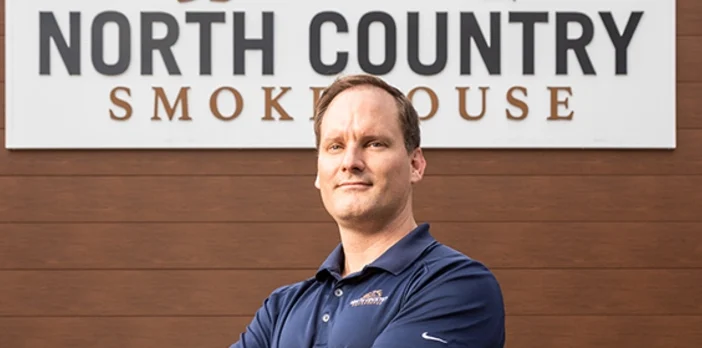
North Country Smokehouse’s local roots give duBreton new growth opportunities nationwide.
North Country Smokehouse needed to go big, and also stay home.
By the mid-2010s the company was bursting at the seams of its Claremont, N.H., smokehouse. Its owner, the esteemed Mike Satzow, was also looking to retire after spending a lifetime building a word-of-mouth mini empire of premium bacon and other smoked pork products that chefs across the country clamored for.
Satzow approached his longtime pork belly supplier, duBreton, about acquiring his business. He did have one condition, though. The smokehouse had to stay in Claremont, a hardscrabble former mill town bordering Vermont, which has been his family’s base in the meat industry for three generations.
“It was actually written into the acquisition agreement, and it was one of his conditions that if you’re going to buy the business, you have to maintain it in Claremont,” says Aaron Corbett, CEO of North Country and duBreton USA. “[Satzow] was born and raised here, and saw what happened when a bunch of businesses closed down.”
Quebec-based duBreton, itself a multi-generational family business of pork producers that has grown into the largest supplier of organic and certified humane pork in North America, smelled opportunity in North Country’s smoky pork products. It bought the company and began planning a new 62,000-square-foot smokehouse to replace the original. The Canadian company, which had strong fresh meat distribution in the retail space but less range on the deli side, bet that a new $35 million smokehouse would be able to take advantage of its vertical integration to push smoked organic and certified humane meats into new markets.
“We have relationships on the retail side with some flagship accounts,” says Vincent Breton, duBreton’s president. “[Satzow’s] business was mainly high-end foodservice and not natural and organic, so we knew we could grow the business.”
The new smokehouse, constructed over a period of 15 months in 2016-2017, sits a few miles down the road from the 15,000-square-foot ‘70s era original. The facility was designed with food safety, efficiency and worker satisfaction in mind, Corbett says. The raw and cooked sides are completely separated, with extensive work on condensation control. Employees are provided a large break room with floor-to-ceiling windows, and the hallway leading into the various sections of the plant also has windows that allow natural light inside. The hallway also serves a functional purpose by creating additional air space between the insulated walls, as does the mezzanine space above the refrigerated area, creating a “shell-inshell” design that improves efficiency.
Beyond those features, North Country knew the new space needed to meet two goals: give the company room to significantly grow its business with capacity to spare, as it grows its retail presence; and ensure that the flavor of its products would not change one iota with the transition.
According to Corbett, the company succeeded.
“Our trademark is our smoke,” he says. “It was critical for us not to change [the flavor], because that’s the signature, and you need to make sure it stays consistent from one plant to the next.” The company used the same recipes and German smokehouses that were used in the old plant, and according to Corbett, the transition to the new plant — at least on the smoking side — was seamless.
That Satzow stayed on with the company for a few years after the transition period helped both on the production and sales side. Corbett shared an office with him in the old smokehouse for two years, soaking up knowledge while the new plant was built out. “I learned a great deal from him,” Corbett says.
A STORIED PAST (AND FUTURE)
North Country made its name in the foodservice industry, building a customer base one chef at a time by delivering on its promise of no-compromise products and responsive service. At the time of its acquisition, North Country was selling 90-95% of its products in the foodservice channel. DuBreton lured Mike Kelly, a former Conagra executive with more than 23 years of retail experience, out of retirement to lead North Country’s retail efforts.
“Retail will become a larger portion of the overall sales, and one of the reasons for that is … in retail, you can easily tell your story on the package, so people can say, ‘I want organic,’ ‘I love the story about the farms,’” Kelly says. “In the foodservice arena, you don’t have that opportunity. . . . A lot of restaurants still haven’t moved to that level of certified humane or organic.”
North Country believes it has a compelling story to tell. It leans into Satzow’s family history in the meat industry, the company’s commitment to not taking shortcuts, and the pursuit of whole, local ingredients for its products. North Country’s maple syrup for curing its bacon and hams comes from a family- run New Hampshire sugar house 20 miles north of the smokehouse. It sources beer and cheese for its sausages from local companies across the border in Vermont, uses real wood chips for its smokers, and has employees peeling onions and measuring whole garlic cloves for flavoring its sausages.
DuBreton, Vincent Breton explains, sees North Country as a synergistic fit for its brand — it brings an animal welfare- focused pork operation to an established artisanal smoked meat producer. By combining North Country’s story and high-quality products with the promise of more humane animal husbandry, duBreton expects to find willing customers at the higher end of the retail segment.
“We’ve taken this really artisanal, high-end product and coupled it with this great organic, certified humane niche story, and that is what I feel differentiates us,” says Corbett. “A lot of people play in the niche space of organic or certified humane, and a lot of people play in this really small batch, low and slow highend product, but there’s not too many out there, I believe, that are doing both.”
North Country also makes sense to duBreton from a carcass balance perspective. “Organic production, GAP production, certified humane — it is a lot more expensive to produce,” Breton says. “It is important to get as much value as you can from the whole animal.” North Country’s value-added smoked sausage, deli meats, hams and other products allow duBreton to add value to trim and less expensive cuts, giving the company a more profitable outlet for all the parts of its animals.
ORGANIC GROWTH
With retail markets firmly in North Country’s sights, Kelly pounded away, moving the company’s bacon and other products into new groceries down the East Coast and into the South. As part of the transition, North Country began to downplay its products that used commodity pork and focus on duBreton’s certified humane and organic meat.
The company modernized its packaging design to put the organic and certified humane certifications front and center. By 2020, the company had grown the business overall while shifting retail sales to 25% (from less than 10%) of the total.
Then the pandemic hit. With a steady supply chain from the duBreton farms and a smokehouse located in a state not hit especially hard by the virus, though, North Country was primed to get meat onto barren grocery shelves. As its foodservice business cratered, the company hacked those lines to add additional retail capacity. It is now selling about 50-50 foodservice and retail, with the expectation that retail will continue to grow, Kelly says.
Earlier this year, the company announced a push into retail spaces in the Western U.S.
“One of the reasons we want to be in the West is that it has the highest development of organic consumers in the country, and there’s a demand out there,” Kelly says. “There are a lot of competitive products being sold that are certified humane or GAP or [antibiotic-free], but no one has as broad a line of organic pork products as we do, so we think there’s an opportunity for us in the organic space in the West.”
Corbett agrees. “The No. 1 organic market across all product lines in the country is California, so it’s a geography we need to play in if we want to continue to grow the organic business.” He notes, however, that the company is also making significant pushes into the South and Midwest.
Breton acknowledges the demand for organic originates from the coasts, but also sees a greater groundswell underway. “We are getting some requests and demand from customers that maybe were not considering organic as important five to 10 years ago, but now with the steady growth and the shift in the consumer mindset, the consumers are looking into what they eat and where it’s coming from,” he says. “It’s not just a geographic growth, it’s a consumer shift.”
Sales seem to bear that out. The company is producing four times the product it was pre-acquisition, and it also has almost four times the number of employees, going from 36 to around 120. “We’d like to have a few more,” Corbett says, noting the tight labor market.
Nonetheless, he is proud that the company is bringing more jobs to the town.
“It’s really cool that we can add another 90-plus people to our payroll and have good-paying jobs — we’re starting wages now at $15 an hour” with management positions a good bit higher, Corbett says. “Hopefully, we can keep it going and continue to grow. Five years from now we are talking about having 240 employees, all from the local area.”
A GROWING FAMILY BUSINESS
Despite the new ownership, North Country still sees itself as a family-run company that is responsive to customer needs and consumer demands. “It’s not a big corporation, it’s not a huge, big business — it’s a family,” Corbett says about duBreton. “It’s people that care about the legacy of their family and care about the animals.”
Kelly concurs: “We’ve still been able to move really fast,” he says. “We’ve had opportunities with customers who asked us to do something specific for them … and we’ve turned that around in two months and had the product produced and packaged and ready. The good news is there’s only a certain number of people who have to get on a call, and we can make decisions really fast.”
While the company plans to continue to offer smaller, one-off products to its customers, it is laser-focused on broadly expanding its organic and certified humane reach. North Country’s strategic plans call for it to introduce three new products a year, and the team is constantly reading the tea leaves of the marketplace to decide what to produce. This fall, the company will be releasing a six-ounce organic ham steak, for example.
“No one is producing an organic ham steak, so we differentiate ourselves right there, and we’ve already had significant interest in it,” Kelly says. “We look and say, ‘What’s doing well in the market, and is there an organic choice?’ If not, maybe that’s the right place for us.”
Read the full article here.
